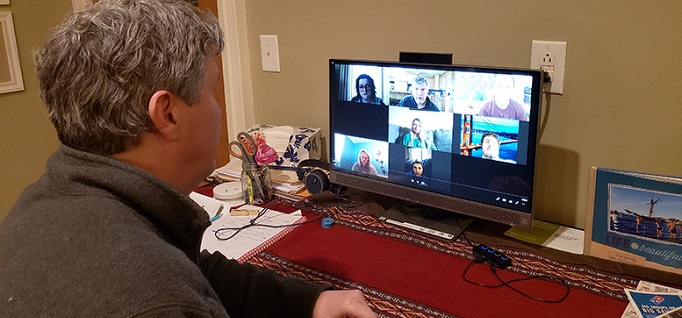Developing a training program for contact tracers
By Matthew Dembicki
May 27, 2020
Proving again that community colleges are flexible, several colleges have quickly developed contact tracer training programs to help curb the spread of COVID-19.
This week, Clark State Community College in Springfield, Ohio, launched an online short-term training program that will prepare contact tracers to help curb the spread of the coronavirus. The college developed the new program in about a month.
Conversations for the program started about a month ago, right after Gov. Mike DeWine noted that Ohio would need 1,750 contract tracers across the state by the end of June. The jobs serve an important role during the COVID-19 pandemic. When someone tests positive for the virus, contract tracers track who that person has contacted and assess their risk. Then they usually reach out to those contacts and inform them of their exposure.
Lesli Beavers, director of Workforce and Business Solutions at Clark State, heard DeWine’s briefing and immediately began talking with college officials to determine if Clark State could help meet that need. The same afternoon, she reached out to local health districts and other healthcare partners to gauge their needs and how the college could help locally and on a state level.
“Having us step in and help with that, they were very appreciative,” Beavers said.
Building a team
What became quickly apparent is that the health facilities in the college’s service area had different needs. Some districts already had their team of contract tracers in place, while others were still determining the job description and what kind of training would be required, Beavers said. Also, in some counties the job could be done remotely, while others required that contact tracers report to the health district office.
At the same time Beavers was talking with community partners, she also began working within the college to start on the training program. With support and guidance from the college’s vice president of academic affairs, she tapped the School of Health, Human and Public Services where she found four faculty members to help develop the content. An extra challenge was that the timing of the project coincided with the teachers’ last few weeks of the spring term, which already was a busy time for them.
The team started by reviewing the Centers for Disease Control and Prevention guidelines. Local health officials helped to connect the faculty members with subject-matter experts to make sure the content addressed local, regional and state training needs.
“There have always been individuals doing this kind of work, but not at a grand scale like now,” Beavers said. “So even for faculty who are long-term experts in the healthcare field and the social work field, there is still a learning curve” on what’s needed.
A strong response
The program has garnered significant interest since it was announced this month. A press release was sent on May 8 that the program was in development, and over that weekend Beavers received about 75 emails from interested residents — and the number has continued to grow since then. Clark State quickly developed a pre-registration link to help follow up with queries. Nearly 50 people registered over the next three days for the training, which costs $50.
“We’re very happy and excited with that,” Beavers said.
Experts say the country needs to hire more than 100,000 contact tracers to alert people who have been exposed to the coronavirus and help stem the spread of the disease. Contact tracers can earn anywhere from $17 to $28 an hour.
A growing number of community colleges, universities and healthcare facilities are developing contract tracing programs. In Maryland, the Community College of Baltimore County is partnering with the county to create online training for contact trace investigators. The Community College of Allegheny County near Pittsburgh is also developing a noncredit course that will be conducted on Zoom over two weeks.
Oakton Community College in Des Plaines, Illinois, plans to launch its remote, self-paced Public Health Contact Tracer Paraprofessional training program on May 26, which the college says can be completed within three weeks. The curriculum for the course, which is already full with nearly 500 enrolled students, covers topics including epidemiology, recognizing health disparities and inequities, contact tracing techniques and healthcare privacy laws.
Initially, the college planned to charge $299 for the program. But this week the Oakton Educational Foundation and other philanthropic partners teamed to offer the program at no cost to participants.
There’s more to the story! Read the full article in CC Daily.



